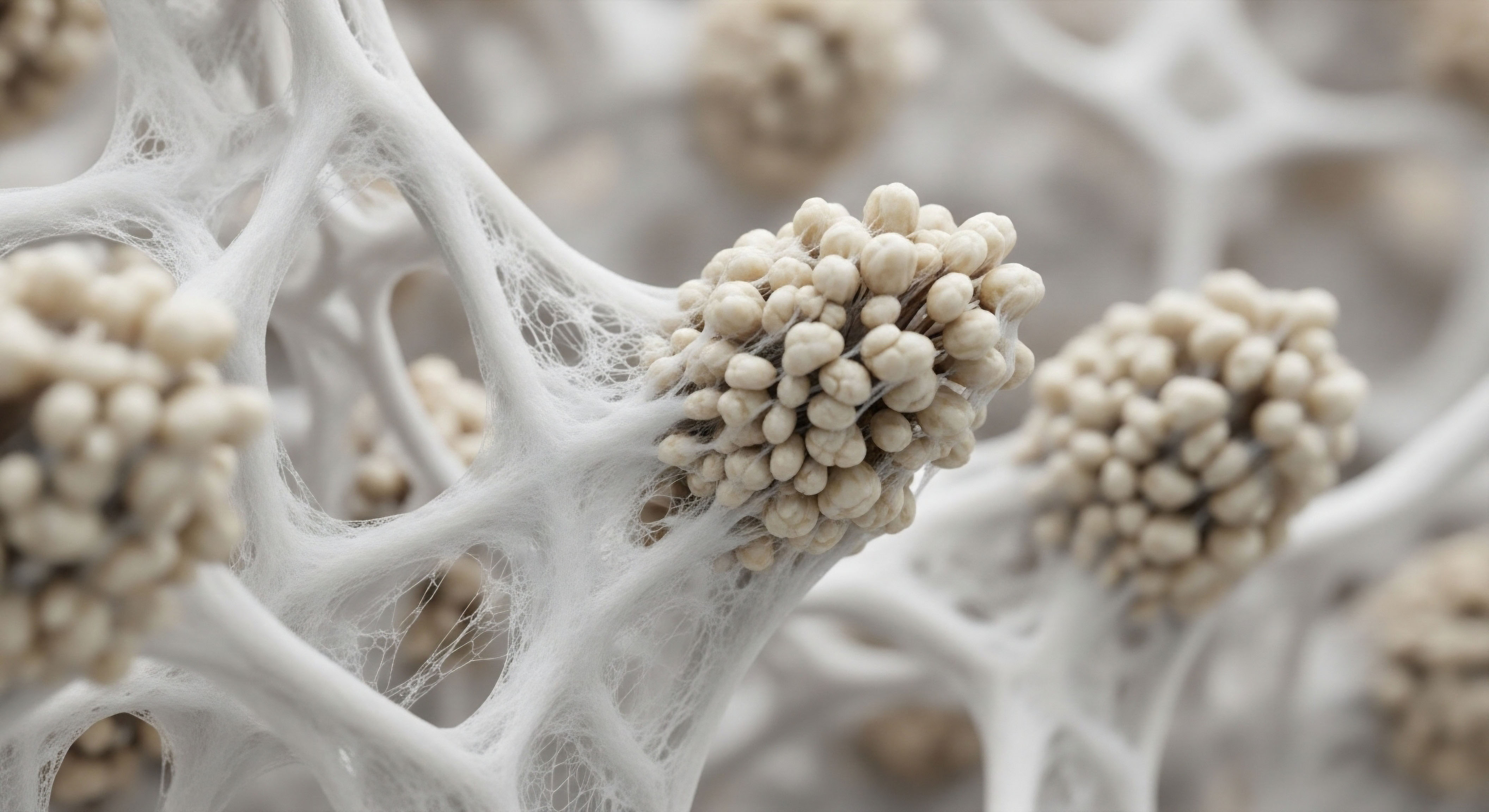

Fundamentals
Have you ever felt as though your body operates on a unique set of rules, distinct from those around you? Perhaps you have experienced symptoms that defy easy explanation, leading to a sense of frustration or isolation. For many individuals navigating the complexities of polycystic ovary syndrome, or PCOS, this experience is profoundly familiar.
The journey to understanding your own biological systems, particularly when faced with a condition as intricate as PCOS, can feel like deciphering a deeply personal code. Our aim here is to validate that lived experience, providing clear, evidence-based explanations of the underlying biological mechanisms at play.
PCOS represents a common endocrine condition affecting women of reproductive age, characterized by a spectrum of symptoms including irregular menstrual cycles, elevated androgen levels, and the presence of polycystic ovaries. Beyond these reproductive manifestations, metabolic disturbances, such as insulin resistance, frequently accompany the syndrome. The variability in how PCOS presents, and critically, how individuals respond to therapeutic interventions, often prompts questions about deeper, intrinsic influences.
Consider the foundational concept of genetic factors. Our genetic blueprint, the unique sequence of DNA inherited from our parents, provides instructions for every cellular process within the body. These instructions dictate the production of proteins, enzymes, and receptors that orchestrate hormonal signaling, metabolic regulation, and cellular communication.
Small variations within these genetic sequences, known as polymorphisms, can subtly alter how these biological components function. These variations do not necessarily signify a defect; rather, they represent a natural diversity within the human population.
The influence of these genetic variations extends directly to how an individual’s system processes and reacts to medications. For instance, a particular genetic variant might alter the efficiency of a drug transporter protein, meaning a standard dose of medication could be metabolized differently in one person compared to another.
This concept, known as pharmacogenomics, is central to understanding individual responses to PCOS treatments. It moves beyond a one-size-fits-all approach, recognizing that personalized care requires an appreciation of each person’s unique biological landscape.
Genetic variations within an individual’s biological blueprint significantly influence how their body processes and responds to therapeutic interventions for conditions like PCOS.
The endocrine system, a sophisticated network of glands and hormones, acts as the body’s internal messaging service, regulating nearly every physiological process. In PCOS, this system often experiences dysregulation, particularly concerning androgens, insulin, and gonadotropins like luteinizing hormone (LH) and follicle-stimulating hormone (FSH).
Genetic predispositions can affect the sensitivity of hormone receptors, the activity of enzymes involved in hormone synthesis, or the signaling pathways that mediate hormonal actions. This inherent variability contributes to the diverse clinical presentations of PCOS and explains why a treatment effective for one individual might yield limited results for another.
Understanding these foundational genetic influences provides a more complete picture of PCOS. It shifts the perspective from simply managing symptoms to addressing the underlying biological mechanisms, paving the way for more targeted and effective interventions. How do these genetic differences translate into observable variations in treatment outcomes?


Intermediate
The journey toward hormonal balance in PCOS often involves various clinical protocols, each designed to address specific aspects of the syndrome. Medications like metformin, oral contraceptives, and anti-androgens such as spironolactone are commonly prescribed. Yet, the effectiveness of these therapies can vary considerably among individuals, a phenomenon increasingly attributed to genetic factors.
Consider metformin, a medication frequently used to improve insulin sensitivity in individuals with PCOS. While many experience significant metabolic improvements, a notable subset finds its benefits limited or encounters undesirable side effects. Research indicates that genetic variations in genes encoding drug transporters, such as Organic Cation Transporter 1 (OCT1), can influence how metformin is absorbed and distributed within the body.
For example, certain polymorphisms in the SLC22A1 gene, which codes for OCT1, have been associated with altered metformin pharmacokinetics, potentially affecting its efficacy in reducing insulin resistance or improving menstrual regularity. This suggests that an individual’s genetic makeup can dictate how efficiently their cells take up and utilize the medication.
Similarly, the response to clomiphene citrate, a common fertility medication for PCOS, is not uniform. Some individuals exhibit clomiphene resistance, failing to ovulate despite appropriate dosing. Genetic variations in the FSH receptor gene (FSHR) have been implicated in this variability. Polymorphisms, such as the Ser680Ser variant, may alter the sensitivity of ovarian follicles to FSH, thereby influencing the success of ovulation induction. This highlights how genetic differences can impact the very receptors that medications aim to modulate.
The effectiveness of anti-androgen therapies, which aim to reduce elevated androgen levels responsible for symptoms like hirsutism and acne, can also be influenced by genetic factors. The androgen receptor (AR) gene itself contains polymorphic regions, such as the CAG repeat length, which can affect the receptor’s sensitivity to circulating androgens.
A shorter CAG repeat length, for instance, might lead to a more sensitive androgen receptor, potentially exacerbating hyperandrogenic symptoms or influencing the response to anti-androgen medications. This demonstrates how inherent genetic variations can modify the target of a therapeutic intervention.
Genetic variations in drug transporters, hormone receptors, and metabolic pathways can significantly alter an individual’s response to common PCOS treatments.
Understanding these genetic influences paves the way for more personalized treatment strategies. Instead of a trial-and-error approach, genetic screening could potentially guide clinicians in selecting the most appropriate medication and dosage from the outset. This precision medicine approach aims to optimize therapeutic outcomes while minimizing adverse reactions.
The table below illustrates how specific genetic variations might influence responses to common PCOS treatments:
| Genetic Marker | Associated Gene | Potential Impact on Treatment Response |
|---|---|---|
| OCT1 polymorphisms (e.g. rs683369) | SLC22A1 | Altered metformin absorption and efficacy, affecting insulin sensitivity. |
| FSHR Ser680Ser variant | FSHR | Reduced ovarian sensitivity to FSH, potentially leading to clomiphene resistance. |
| AR CAG repeat length | AR | Modified androgen receptor sensitivity, influencing response to anti-androgen therapies. |
| STK11 polymorphisms | STK11 | Variable association with metformin efficacy, particularly for metabolic parameters. |
The application of pharmacogenomics in PCOS is still an evolving field, yet its potential to revolutionize patient care is substantial. By considering an individual’s genetic profile, clinicians can move closer to tailoring interventions that truly align with their unique biological needs. This approach aligns with the broader principles of personalized wellness protocols, where biochemical recalibration is guided by a deep understanding of individual physiology.
What are the specific genetic pathways that underpin the diverse metabolic presentations of PCOS?


Academic
A deeper exploration into the genetic underpinnings of PCOS treatment response necessitates a systems-biology perspective, examining the interplay of biological axes, metabolic pathways, and gene polymorphisms at a molecular level. PCOS is a polygenic and multifactorial condition, meaning multiple genes, along with environmental factors, contribute to its manifestation and response to interventions.
One area of intense research focuses on genes involved in insulin signaling and metabolic regulation. Insulin resistance is a hallmark of PCOS, affecting a significant proportion of individuals, regardless of body mass index.
Genetic variations in the insulin receptor gene (INSR) or genes downstream in the insulin signaling cascade, such as THADA, TOX3, and DENND1A, have been associated with increased susceptibility to insulin resistance and metabolic syndrome in women with PCOS. These genetic predispositions can directly influence how effectively the body responds to insulin-sensitizing agents like metformin. For example, certain INSR variants may lead to impaired tyrosine kinase function of the insulin receptor, diminishing cellular glucose uptake and exacerbating insulin resistance.
The hypothalamic-pituitary-gonadal (HPG) axis, the central regulator of reproductive function, is frequently dysregulated in PCOS. Genetic variations affecting components of this axis can influence gonadotropin secretion and ovarian steroidogenesis.
For instance, polymorphisms in the luteinizing hormone/choriogonadotropin receptor gene (LHCGR) or the follicle-stimulating hormone receptor gene (FSHR) can alter ovarian sensitivity to these pituitary hormones, impacting follicular development and androgen production. This genetic variability helps explain why some individuals exhibit pronounced hyperandrogenism, while others primarily experience ovulatory dysfunction.
Genetic variations influencing insulin signaling, androgen receptor function, and gonadotropin sensitivity are key determinants of individual responses to PCOS therapies.
Beyond direct drug targets, genetic factors influencing inflammation and oxidative stress also play a role. PCOS is often associated with a state of chronic low-grade inflammation, which can exacerbate insulin resistance and contribute to ovarian dysfunction. Genes involved in inflammatory pathways, such as those coding for cytokines or their receptors, may contain polymorphisms that modify an individual’s inflammatory response, indirectly affecting their overall metabolic health and responsiveness to treatment.
The concept of epigenetics further adds to this complexity. Epigenetic modifications, such as DNA methylation or histone modifications, do not alter the underlying DNA sequence but can influence gene expression. Environmental factors, including diet, lifestyle, and exposure to endocrine-disrupting chemicals, can induce these epigenetic changes, potentially interacting with genetic predispositions to shape PCOS phenotype and treatment response. This dynamic interplay between inherited genetics and acquired epigenetics underscores the highly individualized nature of the condition.
Precision health approaches for PCOS are increasingly incorporating genomic sequencing to identify these specific genetic markers. This allows for a truly personalized therapeutic strategy, moving beyond empirical prescribing to a data-driven selection of interventions. For example, understanding an individual’s genetic profile related to androgen receptor sensitivity could guide the choice and dosage of anti-androgen medications.
Similarly, knowledge of specific insulin signaling gene variants could inform the selection of insulin sensitizers or even the consideration of growth hormone peptide therapy, such as Sermorelin or Ipamorelin/CJC-1295, which can influence metabolic pathways and cellular repair, particularly in individuals with underlying metabolic dysregulation.
The table below outlines specific genetic loci and their potential impact on PCOS pathophysiology and treatment considerations:
| Gene Locus | Associated Pathway/Function | Relevance to PCOS & Treatment |
|---|---|---|
| INSR | Insulin receptor signaling | Genetic variants linked to insulin resistance severity, influencing metformin or insulin sensitizer efficacy. |
| AR (Androgen Receptor) | Androgen action and sensitivity | CAG repeat length variations affect receptor activity, impacting anti-androgen therapy response. |
| FSHR (FSH Receptor) | Ovarian response to FSH | Polymorphisms can cause clomiphene resistance, guiding choice towards gonadotropin therapy. |
| SLC22A1 (OCT1) | Metformin transport | Variants alter metformin pharmacokinetics, affecting drug availability and metabolic outcomes. |
| DENND1A | Steroidogenesis, ovarian function | Associated with PCOS susceptibility and hyperandrogenism, potentially influencing overall hormonal balance protocols. |
The integration of genetic insights into clinical practice represents a significant step toward optimizing outcomes for individuals with PCOS. By understanding the unique genetic landscape of each person, clinicians can tailor hormonal optimization protocols and metabolic support strategies with greater precision, aiming to restore systemic balance and vitality.
How might genomic data reshape the future of personalized PCOS management?

References
- Dumesic, Daniel A. et al. “Polycystic Ovary Syndrome ∞ A Position Statement of the Androgen Excess Society.” Journal of Clinical Endocrinology & Metabolism, vol. 91, no. 12, 2006, pp. 4712-4719.
- Ehrmann, David A. “Insulin Resistance in Polycystic Ovary Syndrome ∞ Mechanism and Implications.” Endocrine Reviews, vol. 27, no. 6, 2005, pp. 647-674.
- Goodarzi, Mark O. et al. “Genetics of Polycystic Ovary Syndrome ∞ An Update.” Fertility and Sterility, vol. 91, no. 3, 2009, pp. 937-946.
- Legro, Richard S. et al. “Diagnosis and Treatment of Polycystic Ovary Syndrome ∞ An Endocrine Society Clinical Practice Guideline.” Journal of Clinical Endocrinology & Metabolism, vol. 98, no. 12, 2013, pp. 4565-4592.
- Teede, Helena J. et al. “Recommendations for the Use of Metformin in Polycystic Ovary Syndrome.” Journal of Clinical Endocrinology & Metabolism, vol. 91, no. 9, 2006, pp. 3251-3259.
- Yildiz, Bulent O. et al. “Pharmacogenomics of Metformin in Polycystic Ovary Syndrome.” Basic & Clinical Pharmacology & Toxicology, vol. 123, no. 5, 2018, pp. 543-550.
- Diamanti-Kandarakis, Evanthia, and Andrea Dunaif. “Insulin Resistance and the Polycystic Ovary Syndrome Revisited ∞ An Update on Mechanisms and Implications.” Endocrine Reviews, vol. 31, no. 4, 2010, pp. 518-532.
- Azziz, Ricardo, et al. “The Androgen Excess and PCOS Society Statement on the Assessment and Treatment of Excessive Hair Growth in Women.” Fertility and Sterility, vol. 95, no. 6, 2011, pp. 1874-1880.
- Franks, Stephen. “Polycystic Ovary Syndrome.” New England Journal of Medicine, vol. 333, no. 13, 1995, pp. 853-861.
- Rotterdam ESHRE/ASRM-Sponsored PCOS Consensus Workshop Group. “Revised 2003 Consensus on Diagnostic Criteria and Long-Term Health Risks Related to Polycystic Ovary Syndrome (PCOS).” Human Reproduction, vol. 19, no. 1, 2004, pp. 1-12.

Reflection
This exploration into the genetic influences on PCOS treatment responses offers a glimpse into the profound individuality of human biology. Understanding that your unique genetic code shapes how your body interacts with therapeutic agents is not merely an academic exercise; it is a powerful step toward reclaiming vitality. This knowledge empowers you to engage more deeply with your healthcare providers, asking informed questions and seeking protocols tailored to your specific biological landscape.
Your health journey is deeply personal, a continuous process of discovery and recalibration. The insights gained from understanding genetic predispositions serve as a compass, guiding the selection of hormonal optimization protocols, metabolic support strategies, and lifestyle adjustments. This is not about finding a single, universal answer, but about uncovering the most effective path for your distinct physiology.
Consider this information a foundational layer in your personal health architecture. The path to optimal well-being often involves a meticulous, personalized approach, one that honors the intricate connections within your endocrine system and metabolic function. Armed with this understanding, you are better equipped to partner in your own care, moving toward a state of balanced function and sustained vitality.



